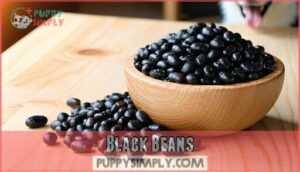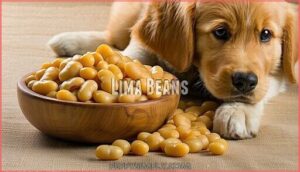This site is supported by our readers. We may earn a commission, at no cost to you, if you purchase through links.

While beans themselves can be a healthy treat packed with fiber and protein, canned varieties are often loaded with sodium, preservatives, and additives that could upset your pup’s stomach or even harm their health.
Some canned beans might also include toxic ingredients like onions or garlic, which are dangerous for dogs.
If you’re thinking about sharing beans with your furry friend, stick to plain, cooked varieties like black, pinto, or lima beans—sans salt or seasoning.
Preparing them at home is your best bet for keeping tails wagging and bellies happy, ensuring a happy and healthy life for your pet.
Table Of Contents
- Key Takeaways
- Can Dogs Eat Beans
- Can Dogs Eat Canned Beans
- Benefits of Beans for Dogs
- Safe Bean Options for Dogs
- Risks of Canned Beans for Dogs
- Preparing Beans for Dogs Safely
- Alternatives to Canned Beans
- Frequently Asked Questions (FAQs)
- What canned beans are safe for dogs?
- Can dogs eat canned beans and rice?
- Can my dog eat canned baked beans?
- Are canned beans nutritionally beneficial for dogs?
- Is it safe to give my dog beans every day?
- Are there any risks associated with feeding beans to my dog?
- Are there any special considerations for feeding beans to puppies?
- Are there any types of beans that are unsafe for dogs?
- Are all canned bean brands equally safe?
- Can dogs eat beans with no salt added?
- Conclusion
Key Takeaways
- Avoid canned beans for dogs because they’re high in sodium, preservatives, and harmful additives that can cause health problems.
- Stick to fresh, plain, cooked beans like black, pinto, or lima beans, and skip seasonings or toxic ingredients like garlic and onions.
- Rinse thoroughly or soak overnight to reduce sodium and lectins; always cook beans well before serving.
- Don’t replace animal protein entirely; beans should be a moderate addition to your dog’s diet.
Can Dogs Eat Beans
Yes, dogs can eat beans, but not all types are safe or healthy.
Understanding which beans to choose and how to prepare them is key to keeping your dog happy and healthy.
Nutritional Benefits of Beans
Beans for dogs are a powerful Protein Power option, packed with Fiber Source benefits and antioxidant-rich nutrients.
A powerful protein source, beans boost digestion, energy, and immunity with their fiber and antioxidant-packed nutrients for happy, healthy dogs.
They’re full of essential vitamins like A, C, and K, along with minerals such as iron and potassium.
These healthy beans for dogs support energy, digestion, and overall wellness, making them a reliable Vitamin Boost and Mineral Content addition to a balanced diet.
Safe Bean Varieties for Dogs
Not all beans are dog-friendly, but several varieties are safe and nutritious.
Green beans, black beans, lima beans, and pinto beans provide healthy options packed with protein and fiber.
These safe beans for dogs support puppy consumption, senior dogs, and overall health when properly cooked to eliminate lectin content, which reduces bean toxicity.
Avoid seasoning to prevent allergy concerns.
Healthy Preparation Methods
To prepare beans safely for dogs, focus on cooking methods that remove harmful substances.
- Soak beans overnight to reduce gas and improve digestion.
- Cook beans thoroughly without additives like salt or spices.
- Mash soft beans for easier serving and nutrient absorption.
Raw green beans are safe and nutrient-rich, while canned beans should be avoided due to additives and high sodium.
Some beans, like kidney beans, require thorough cooking to eliminate naturally occurring toxins, which is a critical step to ensure the beans are safe for dogs to eat, and it helps to remove naturally occurring substances that can be toxic.
Can Dogs Eat Canned Beans
Not all beans are safe for dogs, especially canned ones. Canned beans often pack a punch of sodium that can lead to sodium toxicity, kidney damage, and dehydration.
Many also contain preservatives or additives that may upset your dog’s stomach. Always avoid beans seasoned with garlic, onions, or other toxic ingredients.
While rinsing canned beans helps reduce sodium, it doesn’t eliminate all risks. If you’re considering beans for dogs, stick to safe alternatives like fresh, cooked options.
Reading labels is key—watch for hidden salts and harmful seasonings. Portion control is important too. Incorporate beans into dog food sparingly, ensuring they don’t replace animal protein.
When in doubt, consult your vet before adding canned beans to your pet’s diet.
Benefits of Beans for Dogs
Beans are packed with protein, fiber, and essential nutrients that can support your dog’s overall health.
Adding them to your pet’s diet in moderation may promote better digestion, energy levels, and immunity.
High Protein Content
Packed with plant-based protein, beans for dogs are fantastic protein sources that support muscle development, tissue repair, and growth.
They’re a great way to boost energy production while offering a wholesome alternative to meat in dog food.
Including beans can help maintain muscle health and keep your pup active and strong, delivering essential nutrients for their overall well-being.
Many dog owners find that green beans are safe for canine consumption.
Rich in Fiber and Antioxidants
Fiber in beans keeps your dog’s digestion on track, preventing constipation and aiding bowel health.
On top of that, antioxidants in beans fight free radicals, boosting immunity and balancing blood sugar levels.
While not all beans suit dogs, the right types, like green or black beans, offer fiber benefits and antioxidant types that help maintain overall well-being.
Essential Vitamins and Minerals
In regard to bean nutrition for dogs, essential vitamins and minerals play a vital role.
Beans are rich in iron, zinc, potassium, magnesium, and folate, supporting everything from energy production to healthy bones.
For vitamin absorption and mineral bioavailability, cooked beans work best.
Including them in the right amount prevents deficiency symptoms and guarantees your dog enjoys the full nutritional benefits.
Safe Bean Options for Dogs
When choosing beans for your dog, it’s important to stick with safe options like green beans, black beans, lima beans, and pinto beans.
These varieties are packed with nutrients and, when prepared properly, can be a healthy addition to their diet.
Green Beans
Green beans are a fantastic option for dogs.
They’re low-calorie, high in fiber, and packed with vitamins like A, C, and K.
Raw green beans or properly cooked green beans can be a nutritious snack.
Just avoid using salt or seasonings.
Switching from canned beans to fresh ones guarantees your dog avoids harmful sodium, making green beans safer and healthier.
Black Beans
Black beans are fantastic for your pup’s health. They’re loaded with fiber, antioxidants, and essential nutrients to support digestion and immune function.
When adding black beans to your dog’s food, follow these tips:
- Cook thoroughly to remove harmful lectins.
- Skip seasonings—plain is best.
- Serve in moderation to avoid upset stomachs.
Yes, dogs can eat beans safely when prepared right!
Lima Beans
Lima beans are a safe and nutritious treat for dogs when prepared properly.
Packed with fiber, iron, zinc, and calcium, they support digestion and overall health.
Always soak and cook them thoroughly, as raw beans can be toxic to dogs.
Avoid additives like salt or seasoning in recipes.
Wondering, "Can my dog eat beans?" Yes, if prepared safely!
Lima beans offer several benefits, but it is crucial to prepare them correctly to avoid harm, making them a nutritious treat.
Pinto Beans
Pinto beans are a safe source of nutrition for dogs when cooked properly.
Packed with trace minerals like zinc and manganese, they promote reproductive health and support oxygen transport with their rich iron benefits.
Avoid giving canned beans to dogs due to high sodium. Instead, soak and cook pinto beans thoroughly to enhance digestion and make dog food beans safer.
They provide a rich source of nutrition for dogs when prepared correctly.
Risks of Canned Beans for Dogs
Canned beans can pose serious risks to your dog due to their high sodium content and harmful additives.
These ingredients may lead to dehydration, digestive problems, or even more severe health issues.
High Sodium Content
Canned beans for dogs might seem harmless, but their sodium content poses real risks.
Packed with sodium, canned beans can harm your dog’s health—opt for fresh, cooked alternatives to keep them safe and healthy.
Excess sodium can lead to dehydration, heart health problems, kidney damage, and high blood pressure.
Even rinsing canned beans mightn’t eliminate enough sodium for safety, and to avoid sodium toxicity, it’s crucial to consider alternatives.
To support your dog’s health, stick with safe alternatives like fresh or cooked beans, as canned options, such as high in sodium canned green beans, are approximately 380mg per half cup, highlighting the need for safe alternatives.
Preservatives and Additives
Preservatives in canned beans can sneak into your dog’s diet, causing trouble over time. Watch for additives like sodium benzoate, artificial flavors, and food coloring, which may upset their health.
Canned beans often contain:
- Chemical preservatives
- Food coloring
- Hidden additives
- Excess sodium
- Unnatural flavors
Opt for fresh or cooked bean alternatives to avoid risky dog food preservatives.
Toxic Ingredients
Onions and garlic, often used in baked or chili beans, are toxic to dogs and can lead to severe health issues.
Spices, tomato toxicity, and artificial sweeteners found in canned varieties worsen the risks. These toxic beans for dogs, combined with preservative risks, can expose your dog to harmful additives, making them unsafe.
Prioritize natural options to avoid dog toxin exposure.
Preparing Beans for Dogs Safely
Preparing beans for your dog the right way guarantees they stay safe and healthy. Focus on soaking, cooking thoroughly, and avoiding harmful seasonings or additives.
Cooking Methods
When preparing beans for dogs, you’ve got several cooking methods to choose from.
Steaming beans preserves nutrients, while pressure cooking guarantees safety by breaking down harmful lectins.
Microwaving beans works for quick cooking, but baking beans can add variety.
For ideal digestion, create bean purees after cooking.
Some owners even use a specialized steamer device for their dogs.
Dog bean preparation should focus on safety and nutritional benefits, with an emphasis on ideal digestion.
Soaking and Rinsing
When prepping beans for your dog, soaking and rinsing are key to reducing lectins and minimizing sodium content.
Follow these steps for better digestion:
- Soak beans overnight in cool water.
- Rinse beans with fresh water before cooking.
- Repeat rinsing frequently during cooking.
- Use warm water for final rinsing to further reduce sodium levels and guarantee safety.
Some owners also explore products for preparation to help with the preparation process.
Serving Raw or Cooked
Raw beans can be risky for dogs due to toxins, making cooked beans the safer choice.
Cooking benefits include better nutrient retention and easier digestion. Dogs often find cooked beans more palatable.
If you’re preparing beans for dogs, avoid adding seasoning or salt. Remember, some beans aren’t safe for dogs, so always check for toxic varieties before serving.
Alternatives to Canned Beans
If you’re looking for healthier options than canned beans for your dog, fresh or cooked beans are excellent choices.
They’re free of added sodium, preservatives, and seasonings, making them safer and more nutritious.
Fresh Beans
Fresh beans are a fantastic option for your dog’s diet, offering nutritious, safe choices when prepared properly.
Follow these tips for a healthy addition:
- Choose raw green beans or organic beans for maximum benefits.
- Avoid garden bean dangers; make certain they’re toxin-free.
- Store fresh beans in airtight containers.
- Wash thoroughly to remove residues.
- Check bean sprout safety before serving to ensure a healthy and safe diet.
Cooked Beans
Cooking methods like boiling or steaming guarantee cooked beans retain nutrients and are easy on digestion.
For healthy beans, dogs need plain, unsalted options. Skip canned beans—dogs can enjoy fresh varieties instead.
Thorough cooking eliminates risks associated with raw beans.
Mash cooked beans for easy eating, control portions to avoid gas, and explore recipe ideas to balance their dog diet with protein-packed benefits beans offer, ensuring a healthy and easy digestion, and providing plain options.
Bean-Free Diets for Dogs
Choosing a bean-free diet for your dog can help avoid potential health risks associated with beans while meeting their nutritional needs.
Focus on grain-free options with protein alternatives like fish, eggs, or chicken.
Some dogs may experience dog food allergies, necessitating specialized diets.
Guarantee dietary balance with plant-based protein and animal-based protein alternatives, considering supplementation needs.
This approach supports dogs with food allergies or sensitivities, promoting health without legume-based risks.
Frequently Asked Questions (FAQs)
What canned beans are safe for dogs?
Stick with low-sodium or no-salt-added canned beans, such as black beans, kidney beans, or chickpeas.
Rinse them thoroughly to remove excess sodium before serving.
Avoid beans with added seasonings, spices, or preservatives to keep your dog safe.
Can dogs eat canned beans and rice?
Dogs can eat plain rice with some types of canned beans, but avoid those high in sodium or additives.
Always rinse canned beans first, cook the rice, and skip any seasonings or sauces, to ensure a safe meal.
Can my dog eat canned baked beans?
Better safe than sorry—avoid feeding your dog canned baked beans.
They’re loaded with sugar, spices, and sometimes onions or garlic, which are harmful.
Stick to plain, cooked beans for a safer, healthier treat.
Are canned beans nutritionally beneficial for dogs?
Canned beans aren’t great for your dog.
They’re packed with salt and preservatives that can harm their health.
Stick with fresh, cooked beans instead—they’re safer, healthier, and better for your pup’s digestion.
Is it safe to give my dog beans every day?
Feeding your dog beans daily is safe if they’re cooked and served plain.
But avoid overfeeding to prevent gas.
Rotate them with other foods for balance.
Always skip the canned, spicy, or sugary varieties.
Are there any risks associated with feeding beans to my dog?
About 10% of beans have lectins, which can upset your dog’s stomach if not cooked right.
Also, avoid baked or canned beans with salt, spices, or preservatives—they can cause dehydration or toxicity.
Are there any special considerations for feeding beans to puppies?
Puppies need cooked, plain beans served in small amounts.
Avoid spices, salt, or canned varieties, as their digestive systems are delicate.
Start slow, monitor for any reactions, and prioritize easily digestible options like green beans or lentils.
Are there any types of beans that are unsafe for dogs?
Steer clear of raw, canned, or seasoned beans for your dog.
Certain varieties, like baked beans, chili beans, and coffee beans, contain harmful toxins, spices, or caffeine that can upset their stomach or cause serious health issues, particularly due to the presence of toxins.
Are all canned bean brands equally safe?
Not all canned bean brands are equally safe for dogs.
Many contain high sodium, preservatives, or harmful additives.
Always check the label, choose low-sodium options, and avoid those with added seasonings or sauces.
Can dogs eat beans with no salt added?
Yes, dogs can eat no-salt-added beans, but only if they’re cooked thoroughly and served plain.
Avoid seasonings, spices, or additives.
Proper preparation guarantees a safe, healthy treat packed with protein and fiber for your pup.
Conclusion
While canned beans might seem like a convenient treat, they often come with hidden risks for your dog, like high sodium levels and harmful additives.
Instead, opt for fresh, plain, cooked beans, such as black or pinto beans, which are rich in nutrients and safe for your pup.
Take the time to prepare them properly, avoiding seasonings or toxic ingredients like garlic and onions.
By skipping canned beans, you’ll keep your furry friend both happy and healthy!

















